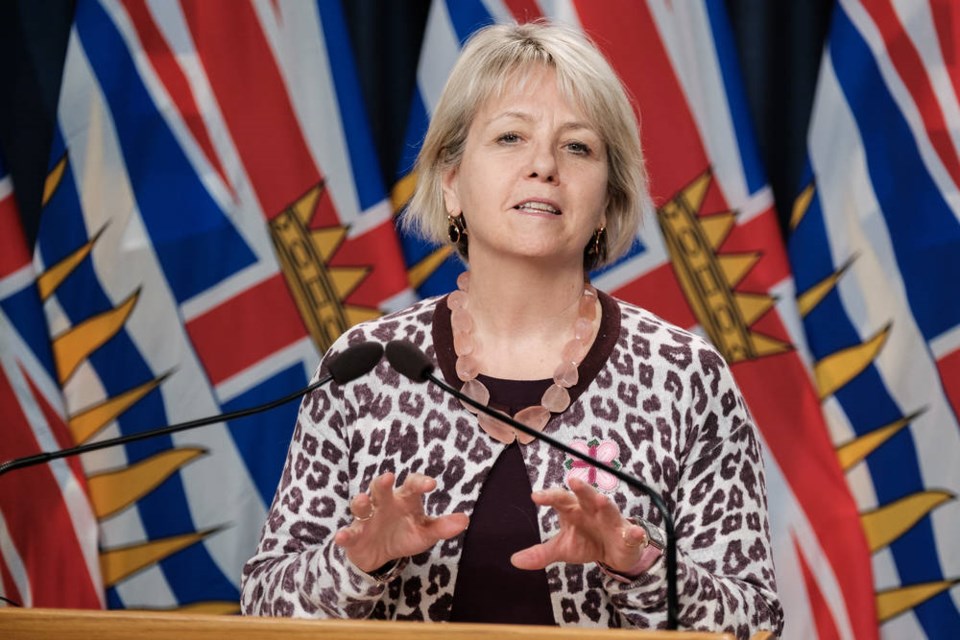Provincial health officer Dr. Bonnie Henry, who is delaying second doses of COVID-19 vaccine to 16 weeks from six to free up vaccine and give every British Columbian a first jab by July, said she is confident in the face of criticism.
Dr. Mona Nemer, Canada’s chief science adviser, has compared B.C.’s delay of second doses with a “population level experiment,” saying that while it’s plausible to do it, we should not tinker with the data provided by Pfizer and Moderna to leave three to four weeks between first and second doses.
Dr. Anthony Fauci, the top infectious disease official in the U.S., said that country will stick to its two-dose regimen, resisting calls to use a single dose to give more people immediate protection, the Washington Post reported.
Henry is standing behind her decision. Studies show that the first dose of the Pfizer and Moderna vaccine is upwards of 90 per cent effective after three weeks and it lasts for several months, preventing serious illness, hospitalizations and deaths, Henry said on Tuesday.
The National Advisory Committee on Immunization has reviewed the data in detail and its statement is “imminent,” she said. “That is why I am so confident that the decision we made over this past weekend to extend that interval is the best one, based on all of the scientific and the data that we have to maximize the benefit to everybody in our community, so that we can both stop people from getting seriously ill, prevent people from needing hospitalization, and prevent people from dying.”
The freeing up of doses to vaccinate more people quickly will allow the province to ease pandemic restrictions much sooner, she said.
The province will be able to increase visits to long-term care facilities “and have families be together with their loved one in care homes before the end of this month,” she said. “We now know from the real-world data that we don’t need to rely on second doses before we can lift some of these restrictions, if we have enough people protected, and we can stop that transmission in our communities.”
Come June or July when everyone in B.C. is protected with a first dose of vaccine, “we will know more about when is the optimal timing for booster dose,” said Henry.
Fauci did not recommend the delaying of doses in the U.S. because he felt they had sufficient vaccine “which is fine,” Henry said. The United Kingdom is also delaying the second dose, and Fauci went on to say “each of those approaches is correct and is right,” she said.
Henry said that Nemer, the chief science adviser, “who obviously was not involved in some of these discussions and decision making … perhaps didn’t understand the context that this decision was made in.”
Infectious diseases specialist Dr. Isaac Bogoch in Toronto said that in December and even January there was hesitancy over delaying the second dose, “but there’s been a growing global experience delaying the second dose and there’s also accruing evidence suggesting that delaying that second dose is a reasonable thing to do.”
If one were to line up 100 scientists, epidemiologists, public health providers and infectious diseases physicians there probably wouldn’t be an argument over delaying the second dose. “I think the argument you’d get is how long can you delay that second,” Bogoch said.
Canada’s chief science adviser has valid concerns, but there’s growing evidence suggesting it’s OK to delay, he said.
“It’s going be just like everything else we have seen in the pandemic,” Bogoch said. “You can have multiple people look at the exact same data and come to different conclusions. And that’s OK, as long as we’re open and honest and transparent about how we’re making our decisions, and we understand what the benefits are and what the potential risks are.”
B.C. Health Minister Adrian Dix said 283,182 doses of COVID vaccine have been administered — 186,654 people have received first doses, 86,537 have received second doses. That includes 95 per cent of long-term care and assisted living residents who have received their first doses of COVID-19 vaccine.
Everyone needs to focus on maintaining all levels of protection including physical distancing, wearing masks, and not gathering outside one’s household, and getting tested if symptomatic, Henry said.
On Tuesday, the province reported 438 new cases of COVID-19, including 19 new cases in Island Health. Of 4,679 active cases, there are 243 people in hospital, including 63 in intensive or critical care. Another 8,445 people who are contacts of an infected person are under public health monitoring.
Two more deaths have been reported, for a total of 1,365 COVID-related deaths since the pandemic began.
Twenty-two new variants of concern have been detected — 159 of the U.K. variant and 23 of the South African variant — of which eight are still active.
The province made a data correction on Tuesday, announcing another 254 cases of COVID-19 over the past week that went unreported.
ceharnett@timescolonist.com



